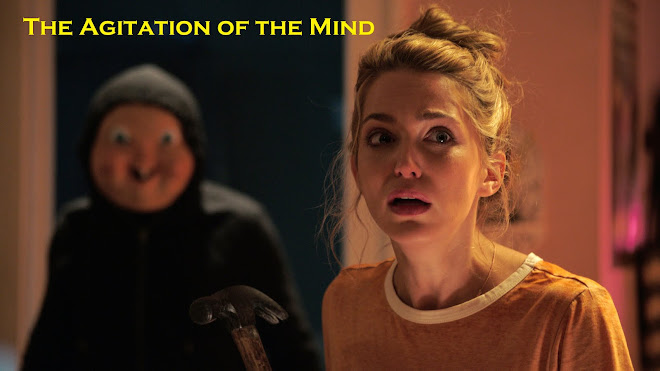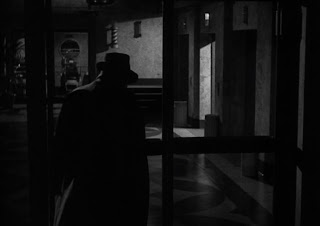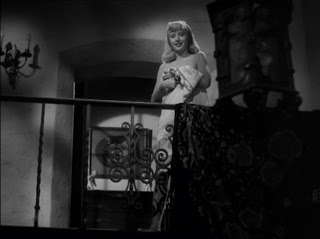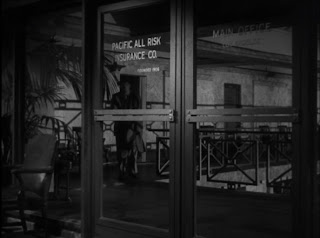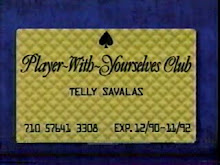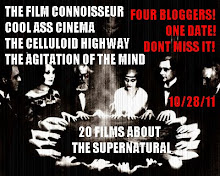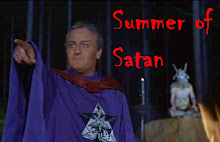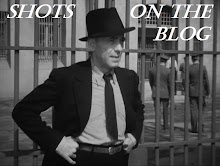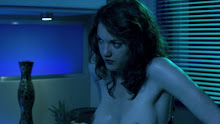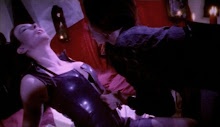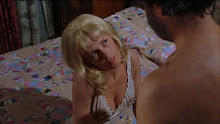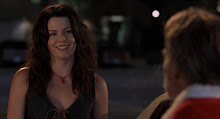
Wednesday, July 29, 2009
PERSONAL FAVES: Double Indemnity
 I think, if I were called upon to explain the term film noir to someone who had no understanding of cinema, I would simply sit them down and show them 'Double Indemnity'. I wanted to avoid starting this review with a big fat piece of opinionism - something I do too often as it is - along the lines of " 'Double Indemnity' is the ultimate film noir". Particularly when film noir boasts some many great examples of itself. But I really do believe that 'Double Indemnity' ticks all of the boxes.
I think, if I were called upon to explain the term film noir to someone who had no understanding of cinema, I would simply sit them down and show them 'Double Indemnity'. I wanted to avoid starting this review with a big fat piece of opinionism - something I do too often as it is - along the lines of " 'Double Indemnity' is the ultimate film noir". Particularly when film noir boasts some many great examples of itself. But I really do believe that 'Double Indemnity' ticks all of the boxes.Norton: Mr Keyes, I was raised in the insurance business.
Keyes: Yeah, in the front office. Come now, you've never read an actuarial table in your life have you? Why, they've got ten volumes on suicide alone. Suicide by race, by colour, by occupation, by sex, by seasons of the year, by time of day; suicide, how committed: by poision, by firearms, by drowning, by leaps; suicide by poison, subdivided by types of poision, such as corrosive, irritant, systemic, gaseous, alkaloid, protein and so forth; suicide by leaps, subdivided by leaps from high places, under the wheels of trains, under the wheels of trucks, under the feet of horses, from steamboats. But Mr Norton, of all the cases of record, there's not one single case of suicide by leap from the rear end of a moving train.
Sunday, July 26, 2009
Hot Fuzz
 It is a truth, universally acknowledged, that Britain is generally a bit of a crap place. I speak as a native. Our weather's crap, our government's crap, our television's crap. It's a good job our cinema's had its fair share of high points - Powell & Pressburger, the Ealing films, Hitchcock, Lindsay Anderson, Tony Richardson, the Scott brothers - otherwise we'd be down to William Shakespeare, football and the royal family to act as standard bearers of our cultural heritage, and frankly that's way too much for one playwright who's been dead 800 years to shoulder on his own.
It is a truth, universally acknowledged, that Britain is generally a bit of a crap place. I speak as a native. Our weather's crap, our government's crap, our television's crap. It's a good job our cinema's had its fair share of high points - Powell & Pressburger, the Ealing films, Hitchcock, Lindsay Anderson, Tony Richardson, the Scott brothers - otherwise we'd be down to William Shakespeare, football and the royal family to act as standard bearers of our cultural heritage, and frankly that's way too much for one playwright who's been dead 800 years to shoulder on his own.And even then I worry about British cinema sometimes. Most of our brightest lights were very quick to make the move Stateside. Those who have stayed tend to a small screen, non-cinematic, people-in-housing-estates-yelling-at-each-other-for-two-hours aesthetic. That, or they disappear up their own fundamental orifices in a welter of pretentiousness. Mentioning no names, Peter Greenaway.
While I'm being decidedly unpatriotic and getting all this off my chest, I may as well offend the middle class critics who have long fawned over them as the leading lights of British cinema and say that I'm not all that keen on the work of Ken Loach or Mike Leigh. Loach, when he gets the balance between cinema and politics right, can pull off a thunderingly good movie - 'Hidden Agenda' and 'Land and Freedom' are bob on - but most of the time the balance is way off kilter and he's too focussed on making a polemic to make cinema. Mike Leigh I find downright patronising. I'm working class (grandfather: miner; father: truck driver) and I don't recognise Leigh's characters. They have none of the earthy humour, colloquial loquacity and cameraderie that I've seen first hand. Sight & Sound would never publish me for saying this, but it deserves saying: 'The Full Monty' is a more realistic depiction of working class life than anything by Mike Leigh.
All of which is a 300-word way of saying thank God and all His little angels for Edgar Wright. Two films into his career (and I'm gnashing my teeth to think that he's already defected across the pond for his third feature) and he's made two British films, set in recognisably contemporary British locations, full of British actors playing quintessentially British characters, the situations and satirical elements imbued with a distinctly British strand of dry humour ... and both films have been cinematic, pacy, massively entertaining and funny as fuck.
'Shaun of the Dead' was a knowing send-up of George A Romero's undead saga that I can't imagine any other British filmmaker attempting - let alone pulling off. (Ken Loach's 'The Wind That Shakes the Zombie'? Mike Leigh's 'Happy Go Zombie'? Don't think so!) It also had enough bite that it succeeds as a stand-alone film. With a cast of small screen comedy greats (Simon Pegg, Nick Frost, Dylan Moran, Lucy Davies, Martin Freeman) and an authentic big screen legend (Bill Nighy), a script that juggled the laughs and the gore without missing a beat, and some brilliantly true to life moments (fleeing a horde of flesh-munching zombies? where do you go? shopping mall? military base? course not! pub, innit?), 'Shaun of the Dead' was so assured and accomplished that it seemed like Wright had wrought himself a fucker of a hard act to follow.
Then he went and made 'Hot Fuzz'. The talented bugger.
There are those who hold 'Shaun of the Dead' as the better film, but for me 'Hot Fuzz' is pure comedic genius. Wright and co-writer Pegg basically take the mismatched-partners-tough-talk-car-chases-blow-shit-up buddy movie ethos beloved of Hollywood, shake up all the cliches, and restage the whole thing in a sleepy Home Counties market town. The kind of place where everyone knows everyone else. The kind of place that wins "best kept village" awards. The kind of place that has an amateur dramatics society but no cinema.
Not that this bothers half-arsed copper PC Danny Butterman (Frost). He prefers the pub to the theatre, plus there's his extensive collection of action movies on DVD (his personal faves: 'Point Break' and 'Bad Boys II'). He's delighted when he gets partnered with Nicholas Angel (Pegg), an ambitious Londoner transferred out of the metropolis after the top brass decide that his outstanding arrest record and string of commendations makes everyone else look bad. Danny plagues Nick with endless questions about life in a more action-packed constabulary (for example, "have you ever fired your gun in the air while screaming Aaaaaarrrrgggghhhh?")
Nick finds it hard to share Danny's excitement. His commitment to diligent police work earns reprimands from new boss Inspector Frank Butterman (Jim Broadbent) and the mockery of Special Branch bods DS Andy Wainwright (Paddy Consodine) and DC Andy Cartwright (Rafe Spall). He finds his duties (wielding a speed camera, officiating at a church fete tombola) banal to the point of humiliating. His biggest case is the disappearance of a local swan.
Then the murders start. Full-blooded, hilariously graphic affairs. Wright lets horror movie imagery sit cheek-by-jowl with cop movie iconography (his double homage to 'Scream' is a treat) and the effect is peerless. The short, zippy scenes and full-tilt editing are matched by the thick-and-fast barrage of in-jokes. The aforementioned 'Point Break' and 'Bad Boys II' get their key moments gleefully sent up; a running joke about one of the am-dram members being an extra in 'Straw Dogs' sets up a pub shoot-out/mantrap decapitation that's absolutely priceless; 'Scream' and 'The Omen' nudge up against each other; a 'Shaun of the Dead' DVD makes a blink-and-you'll-miss-it cameo; the leather-jacketed Special Branch types are pure 'Sweeney'; and there's a dash of Sergio Leone in the build-up to a screamingly funny gun battle that plays out like Sam Peckinpah on laughing gas or John Woo meets 'Last of the Summer Wine'.
For all the broad comedy, the best gags are the least obvious: Nicholas Angel's badge number is 777 (in theology often consider the number of God just as 666 is the number of the beast); the only character who refers to him by his number is Simon Skinner, played by former Bond (ie. 007) Timothy Dalton; the shotguns Nicholas and Danny use in the climactic shoot-out are Winchesters (the name of the pub in 'Shaun of the Dead'); identical twin brothers are differentiated by their choice of reading matter: a contemporary novel by Iain Banks and a sci-fi by Iain M. Banks (Banks is one and the same author, who uses the M. to differentiate the types of fiction he writes; the brothers are played by the same actor); the contemporary Banks novel is 'Complicity' - filmed, not entirely successfully, by Gavin Millar - which concerns a series of murders staged ironically according to the misdeeds of the victims, a concept embraced by the conspirators in 'Hot Fuzz'.
The cast is eclectic: in addition to Dalton and Broadbent, Edward Woodward, Billie Whitelaw and Kenneth Cranham do some of their best work in ages, while Bill Nighy and Martin Freeman return in an effective cameos, alongside Steve Coogan. In fact, there's no-one, even in the smallest roles, who strikes a wrong note. Not only does Wright have an ear for dialogue, an eye for the cinematic, and a sense of humour tuned with radar-like effectiveness to the genuinely funny, but he's also a bloody good actors' director. As I may have mentioned before, talented bugger.
Friday, July 24, 2009
I'm Not Scared
Then you remember that director Gabriele Salvatores is best known for his 1991 Oscar-winner 'Meditteraneo' - a sun-dappled war movie, untroubled by the grungy business of war, in which sod all happens, very prettily, for an hour and a half.
You strap yourself in, making sure there's a beer or a bottle of wine or a glass of scotch to hand. You offer up a vague prayer that the phone will ring, or there'll be a knock at the door. Something to relieve the 97-minute tedium of Einaudi and waving cornfields and the kind of blue skies you normally get in holiday brochures where you just know the photographer's gone to town with the polarising filter. Does this sound snide? I'm not kidding: 'I'm Not Scared' is so cloyingly gorgeous in places that it makes your average David Lean epic look like it was shot hand-held on a cameraphone on the streets of Beirut.

And then this happens:
The kids race to a deserted farmhouse, the loser having to pay a forfeit. When Michele (Giuseppe Cristiano) complains that he was only last because his sister Maria (Giulia Matturo) tripped, gang leader Skull (Stefano Biase) picks on tubby and defenceless Barbara (Adriana Conserva), randomly declaring her the loser. The other kids back him up. Barbara, becoming tearful, asks what the forfeit is. "Show it to us," Skull sneers - 10 years old and you can already tell how shittily he's going to treat his girlfriend/wife/casual flings later in life. When Barbara hesitates, Skull slaps her. Barbara, pathetically, starts fumbling at the buttons of her skirt and suddenly the golden corn and the bright blue sky and the swirling violins seem like they were all part of a different movie, one you watched a couple of weeks ago. You start wondering where Salvatores is going with the scene. When he's going to call time on it.
Fortunately, Michele does the decent thing and takes the forfeit on himself (he's made to walk a rickety beam across an otherwise fallen-in ceiling then leap from an upper window into the branches of a nearby tree) but the scene has been soured, the bright summer's day darkened, the prettiness marred and the point made: kids can be evil little sods.
And more so, the film avers as it progresses, their parents.
When Michele and Maria return to the deserted farmhouse to find Maria's glasses, Michele discovers a hole covered with a piece of corrugated metal. Prising it back, he sees something at the bottom of the hole. A foot. A child's foot. Michele panics, leaps on his bike and pedals away like mad.
It doesn't take him too long to return, though. Tired of Skull's bullying, tired of the tense atmosphere at home - his father Pino (Dino Abbrescia) is often away, his mother Anna (Aitana Sanchez-Gijon) is prone to mood swings - the hole and the mystery of its occupant are too priceless a secret and Michele keeps going back.
The young boy in the hole (he's Michele's age) is called Filippo (Mattia Di Pierro) and he's been kept underground, in the dark, for so long that he's convinced he can't see. More than that: he's convinced he's dead and that Michele is an angel. Michele's parents know a lot more about him, though. He's the child of a rich couple, the victim of a kidnapping arranged by Pino's bullish and unpredictable friend Sergio (Diego Abatantuono). Only their little get-rich-quick scheme (which all the adults in the village are in on) isn't paying off as expected. The money's not appearing and Filippo's becoming a liability. Soon they're drawing straws to see who undertakes the grim business of disposing of him.
'I'm Not Scared' is almost a very good film. It captures the sense of wonder, the sense of immediacy, that children exhibit towards the world. Never mind that Michele has found someone imprisoned in a hole, leg shackled - it's an awesome secret that nobody else knows (or so he thinks - for a while, anyway) and while he feeds Filippo and takes him water, even contriving for a short period to bring him out of the whole, it doesn't occur to him until very late in the day - until, specifically, he sees Sergio with a gun and understands exactly what Sergio intends on using the piece for - that Filippo might actually appreciate being released.
Salvatores captures the darker aspects of childhood, as well. There's the scene mentioned at the start of this review. There's Maria expressionlessly "drowning" her Barbie doll in a water trough ("she was broken anyway"). There's Pino's frequently rough treatment of Michele.The film is set in 1978, the Seventies being a time when parents could happily wallop their kids without any Social Services intervention (I speak from experience on this point) and short-tempered lorry driver Pino only seems able to show affection to his son by engaging him in arm-wrestling competitions. Elsewhere, he berates the boy harshly, at one point yelling in his face "Get lost".

Similarly, the pastoral cinematography occasionally peels away the glossiness of its own veneer and DoP Italo Petriccione incisively evokes the dirt poor village, the drab houses and the hardscrabble lives of the inhabitants. Sadly, the veneer is smoothed back into place for the finale, Salvatores ramping up the melodrama and steering things firmly into Spielberg territory. Mawkish music? Check. Emotionally manipulative direction? Check. A huge bright light beaming down on the protagonist? Check. The niggling sense that this could have been a really punchy, powerful and thought-provoking ending if only the film-makers had demonstrated the courage of their convictions and not gone the cheap, hollow, shamelessly tear-jerking route? Check, check, check.
It's apposite that the closing frames of 'I'm Not Scared' are as flawed as the opening ones. Style and content, set-piece and cinematography, dialogue and music all seem to be at odds with each other. This is European cinema slavishly trying to emulate Hollywood and unless you're Luc Besson and believe in the holy trinity of car chases, shoot outs and hand-to-hand, that can only be a bad idea.
Tuesday, July 21, 2009
The Limey
 I know I've disparaged the whole 'Movie-X'-meets-'Movie-Y'-as-an-easy-way-of-pigeonholing-'Movie-Z' school of film criticism in these pages before (and rightly so: it's a lazy and unimaginative way of writing), but in the case of 'The Limey' there's no other way of putting it:
I know I've disparaged the whole 'Movie-X'-meets-'Movie-Y'-as-an-easy-way-of-pigeonholing-'Movie-Z' school of film criticism in these pages before (and rightly so: it's a lazy and unimaginative way of writing), but in the case of 'The Limey' there's no other way of putting it:'The Limey' is 'Get Carter' meets 'Last Year at Marienbad'.
Feel free to stop reading at this point, pour a large glass of scotch, maybe re-watch Mike Hodges' amoral revenge-thriller classic and Alain Resnais' oblique arthouse puzzler back-to-back, and then ponder long and hard on the implications of that comparison.
I'll say it again: 'The Limey' is 'Get Carter' meets 'Last Year at Marienbad'.
Director Steven Soderbergh takes a fairly humdrum premise - British career criminal goes to America to find out the truth behind the death of his daughter and gets medieval on the collective asses of anyone and everyone who was either involved or stands in his way - and turns it into an avante-garde experiment in editing, narrative dissonance and aesthetic abstraction.
At this point I need to give myself a bollocking for using the phrase "aesthetic abstraction" because it exemplifies the kind of wanky analytical film writing I started The Agitation of the Mind to get away from. But again, I'm screwed if I can find another way of putting it. 'The Limey' is a genre movie put on the psychiatrist's couch, encouraged to indulge its more violent and antisocial tendencies as part of its therapy, then reconstructed as a divisive, discursive and challenging art movie.
What defines 'The Limey' is its editing. How many movies do you remember principally for the way they're edited? The work of Godard. The aforementioned 'Last Year at Marienbad'. That's about it. Of course, there are movies aplenty which demonstrate effective use of editing - take virtually any summer tentpole action movie: a fight scene, chase or shoot out is only as good as the editing. A sloppily edited shoot out will have no spatial continuity and leave you thinking that bullets are whanging about all over the place and the combatants sheltering in entirely different locations. An uninterestingly edited car chase will simply reduce speed, tension and white knuckle stunt driving to interminable shots of one car following another car. But the most memorable fights and shoot outs and car chases are edited to emphasise the fighting or the shooting or the chasing - seldom does the editing call attention to itself.
Except in the case of 'The Limey', which might as well open with the credit "a film edited by..."*. This is editing which not just calls attention to itself, but happily demolishes the linear and the logical (several dialogue scenes feature non-speaking participants). It goes beyond montage, juxtaposition, flashbacks or flashforwards. It's more like a cardsharp shuffling the very movie, dealing out scenes and images and iconography, sweeping them up from the table again and cutting them back into the pack. It's a frustrating or utterly joyous viewing experiencing depending on your mood, your genre expectations and whether you might have consumed proscribed substances prior to watching.
The 'Get Carter' comparison is apposite: Michael Caine's eponymous tough guy and Terence Stamp's career criminal Wilson both hail from London; Carter arrives in Newcastle a fish out of water and needs help from one of the locals to find his way around, Wilson touches down in L.A. and relies on his contact Ed Roef (Luis Guzman)'s help to assess the lie of the land; Carter's after the truth behind his brother's death, Wilson his daughter's. Both rampage from one encounter to the next in bull/china shop stylee.
Wilson's trail leads him to record producer Terry Valentine (Peter Fonda). A fellow '60s icon, Fonda is an ideal counterweight to Stamp's stentorian intensity. Their respective backgrounds set up a sneaky little subtext - East End vs East Coast - to the culture clash scenario writ so large elsewhere in the film. "There's one thing I don't understand," declares a
And yet it works. It works because the great Luis Guzman is such a laconic foil to Stamp. It works because the film looks so good. It works because Soderbergh assembles a kick-ass '60s soundtrack (any film that kicks off with a blast of The Who automatically wins points with me).
And it works for exactly the reason it shouldn't. It constantly reminds you that you're just watching a movie. The very nature of the editing is a statement of self-reflexive intent. That Soderbergh cuts in footage of Stamp in Ken Loach's 'Poor Cow' by way of flashbacks takes it further and reminds you that you're not just watching a movie but that the guy in the lead role is an actor who's been in other movies. This would normally be the point at which my interest would be killed stone dead, a priest summoned and the last rites performed.
And yet it works. Even though it shouldn't. And that in itself is part of the pleasure.
*For the record 'The Limey' was edited by Sarah Flack, one of her three collaborations thus far with Soderbergh.
Sunday, July 19, 2009
PERSONAL FAVES: The Man Who Wasn't There

Ed Crane (Billy Bob Thornton) doesn't have much to say. He's married to Doris (Frances McDormand), a hard-nosed and sharp-tongued would-be social climber who's carrying on with her boss, department store owner Big Dave Brewster (James Gandolfini) in hopes of fast-tracking her way to a managerial position. Ed works at his brother-in-law Frank (Michael Badalucco)'s barber's shop. Michael's the principle barber, the raconteur. The guy who yacks incessantly to the customers. Ed keeps himself to himself. Doesn't say a lot. He just cuts the hair.
One day Ed cuts the hair of entrepeneur Creighton Tolliver (Jon Polito), who pitches him a business deal. $10,000 and Ed can buy his way into a dry cleaning franchise as a silent partner. Ed sees it as his ticket to a better life. He sends Big Dave a blackmail note, citing knowledge of his affair with Doris and demanding $10K. Big Dave approaches Ed for advice. Ed advises him to pay.
Big Dave coughs up the moolah, but by coincidence sees Tolliver at the drop point. Unbeknowst to Ed, Tolliver had already approached Big Dave as a potential backer, asking for $10K. Big Dave puts two and two together, makes five, goes to see Tolliver, beats the truth out of him and puts two and two together a second time, this time coming up with four. Big Dave approaches Ed again, only it's not advice he wants now. This time he wants Ed's head as a paperweight.
Things take an unexpected turn, however, and Big Dave ends up dead and Ed calmly goes into work the next day like nothing happened. Then a couple of detectives visit him at the barber's shop to inform him Doris has been arrested. The cops have wised up to her affair with Big Dave and - unbeknowst to Ed - the money she's been skimming from the department store - and come up with five. She's charged with murder and arraigned for trial.
Anybody cursing me for not flagging a "spoiler alert" alert right now should take a leaf out of Ed's book: sit down, lit a cigarette, watch the world drift past and ruminate on twists of fate that life conjures up. They should also take comfort from knowing that 'The Man Who Wasn't There' - as serpentine as its plotting is (and it's the equal of 'Miller's Crossing' in this respect) - reaches a point, about halfway through when Big Dave's wife Anne Nirdlinger Brewster (Katherine Horowitz) starts speculating about UFOs and government conspiracies, where plot ceases to matter. Where the whole film reaches a level of visual poetry (frequent Coen collaborator Roger Deakins achieves a pinnacle of the cinematographer's art that can justifiably be called genius). Where the visual poetry is matched by the verbal poetry of Ed's increasingly discursive and existentialist voiceover. For a character who has the absolutely minimum of dialogue, Ed narrates screeds of voiceover.
For the record, the plot as it develops (or devolves, or branches off, depending on personal opinion) encompasses Ed's old friend Walter Abundas (Richard Jenkins) and his pianist daughter Birdie (Scarlett Johannson), and hot-shot lawyer Freddy Riedenschnieder (Tony Shalhoub), a man who builds defences around the uncertainty principle and an almost Ayn Rand-like conception of the modern man. The film's title works on two levels: the disappearence of Tolliver, potentially a crucial witness in Riedenschnieder's defence of Doris; and Ed's estimation of himself.
As the fallout from his blackmail scheme takes ever-more unpredictable turns, bizarro twists of fate complicating matters to the point that when Ed confesses all to Riedenschnieder the lawyer dismisses his entire story because he'd be unable to prove a word of it (!), everyone but Ed seems to pay the price. Like dominos falling, everyone he knows topples; is brought down. Finally, he sees in Birdie's talent for the piano a chance to be a positive influence in someone's life; a chance at redemption. Fate has other ideas in mind.

'The Man Who Wasn't There' is at once the perfect synthesis of everything the Coens had done up to that point, and a stylistic departure. A departure in that (a) it's their first and currently only production in black and white, and (b) their previous films, for all their quirkiness, are still immediate, if not visceral: think of the violence in 'Blood Simple' or 'Miller's Crossing', or the manic protagonists of 'Raising Arizona' and 'The Hudsucker Proxy' and 'O Brother Where Art Thou'. 'The Man Who Wasn't There' has a stillness about it; a detachment. Its aesthetic is reductive, to the point of a harsh clinically white set for the final scene, the sole focal point of which is the electric chair.
And yet it's a distillation of their previous work in terms of cultural touchstones: the convoluted fictions of Raymond Chandler and Dashiell Hammett inspired 'The Big Lebowski' and 'Miller's Crossing' and there are hints of both here as well as a dash of Jim Thompson - the blackmail element climaxes quarter of the way into the film, the murder element about halfway, and it's an out-and-out aftermath story thereafter; as well as in terms of visual tropes.
There is probably a scholarly paper somewhere out there entitled "Circular Images in the Films of Joel and Ethan Coen". It's probably as dry as a year-old madeira cake, full of pretentious waffle and will land its desperately earnest author a gig writing for Sight & Sound. I'm almost tempted to write it myself, but I've no truck with the kind of people who endlessly debated the meaning of the hat blowing through the woods in 'Miller's Crossing' (for fuck's sake, Tom says it himself: it was a dream and "it stayed a hat ... I didn't chase it ... nothing more foolish than a man chasing his hat") so I'll simply point out the Coens' love for round objects - the tumbleweed and bowling balls in 'Lebowski' and the hula-hoop in 'The Hudsucker Proxy' are here matched by circles of light, a hubcab, the hard white disc of a searchlight and a UFO. The latter is possibly a dream or hallucination. Possibly.




I'm tempted to say 'The Man Who Wasn't There' is the ultimate Coen brothers film, only it doesn't feature John Goodman, John Turturro or George Clooney in the cast. Still, what's inarguable is that 'The Man Who Wasn't There' is achingly beautiful. Beautiful to look at. Beautiful - in Thornton's laconic narration and a soundtrack consisting almost entirely of Beethoven's piano sonatas and the Archduke Trio - to listen to. It did seem, though, for a brief time - with the entertaining but determinedly mainstream 'Intolerable Cruelty' and the just plain average 'The Ladykillers' as follow-ups - that it represented the Coens' peak. Then they made 'No Country for Old Men'. Which goes to show how much I know.
PERSONAL FAVES: Miller's Crossing
Tom: Dream I had once. I was walking in the woods, dunno why. Wind came up, blew my hat off.
Verna: And you chased it, right? You ran and ran. Finally caught up to it and you picked it up. But it wasn't a hat anymore. It changed into something else. Something wonderful.
Tom: No, it stayed a hat. And no, I didn't chase it. Nothing more foolish than a man chasing his hat.

'Miller's Crossing' opens in a manner deliberately evocative of 'The Godfather'. There's a man sitting behind a desk in an office dominated by dark wood. He's nonchalant, lugubrious, in control. There's a short, sweaty, agitated guy standing in front of the desk. He's come to beg a favour. But where 'The Godfather' gives us Don Corleone and Bonasera, the latter wanting justice for an assault on his daughter, the former prepared to help so long as Bonsera might one day discharge a duty to him, the set up is very different in 'Miller's Crossing'.
Behind the desk: Irish-American mob boss Leo O'Bannion (Albert Finney) and behind him his trusted lieutenant Tom Regan (Gabriel Byrne). In front of the desk - and, by the end of the scene, leaning over it, every blood vessel in his face threatening to burst, up-and-coming gangster Johnny Caspar (Jon Polito) and his second-in-command Eddie Dane (J.E. Freeman). And the favour? Well, that concerns bent bookie Bennie Bernbaum (John Turturro) and the various reasons Johnny Caspar wants him dead. Leo ixnays the killing, reminding Johnny that "you're only as big as I let you be". Johnny storms out. Tom counsels Leo that a conflagration with Johnny and Eddie Dane would be unwise, particularly over schnook like Bennie Bernbaum. Leo laughs it off. Then the opening credits roll and what follows is just under two hours of the tricksiest, most convoluted plotting the gangster genre has ever seen.
In brief - and this is without factoring in Tom's gambling debts and the importance to the plot of fast-talking secondary character Mink (Steve Buscemi) - the rivalry between Leo and Johnny Caspar that comes to a head over Bennie Bernbaum is complicated by Leo's doting romance with Bennie's sister Verna (Marcia Gay Garden), a vampish good-time girl who's working out more angles than a geometrist, and Tom's clandestine affair with same. The murder of a tail Leo puts on Verna exacerbates an already tense atmosphere.




Johnny Caspar pressures Tom to leave Leo's organisation and work with him instead. His powerplay is demonstrated by an attempt on Leo's life. However, it's unsuccessful. Leo fends off his attackers with a tommy gun (earning an approving "the old man's still an artist with a Thompson" from a minion) while "Danny Boy" plays on a wind-up gramophone.

The relationship deteriorates between Tom and Leo, culminating in the revelation that Tom and Verna have been doing the wild thing. Leo makes Tom redundant (that's the mob version of redundant, where you take a beating first then get bodily thrown off the premises) and Tom approaches Johnny Caspar to see if the job opportunity is still available. Johnny wants an act of good faith from Tom. He wants Tom to give up Bennie Bernbaum. Tom obliges, but isn't prepared for his next test of loyalty: take Bennie into the woods down near Miller's Crossing and put a bullet in his brain. Tom's not cut out for this kind of thing and when Bennie pleads for his life, Tom lets him go. Bad move. Bennie's working out a few angles of his own and it's not long before he reappears on the scene and starts making life difficult for Tom. Meanwhile, Eddie Dane - suspicious of Tom's proximity to Johnny Caspar - figures that Tom would "rather join a ladies' group" than whack a guy and takes him on a little trip back to Miller's Crossing to look for the body ...

'Miller's Crossing' has more twists than a sack of snakes - and just as much venom. More turns than a wrongly-programmed satnav - and takes you on just as confusing a journey. It's dark and cynical. It's brutally amoral and violent. In addition to the shoot-outs and molotov cocktails through windows, Tom seems to take a blow to the face every five minutes - from Leo, from Verna, from Eddie Dane, from Bennie, from any of the guys he owes money to. Everyone wants something from him, and everyone's got an angle. Amazingly, having said all that, 'Miller's Crossing' is also funny as hell. Johnny Caspar's losing-the-point monologues and Mink's mile-a-minute colloquy are hilarious verbal pyrotechnics. Elsewhere, wise-ass dialogue abounds. "If I'd known we were going to cast feelings into words, I'd've memorised the Song of Solomon," Tom muses at one point. Later, as lost for words as he is for Bennie's corpse, Tom walks fearfully through the woods. "You ever notice," Eddie Dane observes, "how the smart dialogue dries up the moment a guy starts soiling his union suit."

But it's Verna - and Marcia Gay Harden has never been better - who has the last word. When Tom, looking for her at Leo's behest, angrily bursts into a powder room and confronts her, she asks, "Shouldn't you be doing your job ?" He replies, "Intimidating helpless women is my job." Her comeback: "Then go find one and intimidate her." Amen, sister!
Coen brothers double bill
Consider the brooding neo-noirs of their remarkable debut 'Blood Simple' and their masterful return to form 'No Country for Old Men'. Consider the slapstick capers on display in their frenetic sophomore film 'Raising Arizona' and their somewhat misconceived Ealing comedy remake 'The Ladykillers'. Consider the complications of kidnapping in wintry police prodecural 'Fargo' and Chandleresque slacker fave 'The Big Lebowski'.
Consider crims on the run in 'O Brother, Where Art Thou?' and gangsters whose hats have a tendency to gust poetically through the woods in 'Miller's Crossing'. Consider a man who just cuts hair getting in deeper and deeper in 'The Man Who Wasn't There'.
Even their more lightweight films are layered with lawlessness, be it corporate crookery in 'The Hudsucker Proxy' or a plot development involving a bumbling asthmatic hitman in 'Intolerable Cruelty'.
In fact, with 'Burn After Reading' just a stone's throw from the crime genre (it's an espionage tale, but one set in motion by an act of theft), there's really only 'Barton Fink' that doesn't fit into the scheme of things. Unless of course the crime in question is that done by Hollywood to the artist.
Two Coen classics in the offing today, both from the personal faves list.
Thursday, July 16, 2009
Bound
 Released from prison after a five stretch for the "redistribution of wealth", Corky (Gina Gershon) lands a bum job fixing up an apartment in a mob-owned tenement block. The people next door are Caesar (Joe Pantoliano) and his moll Violet (Jennifer Tilly). Caesar works for Gino Marzzone (Richard C Sarafian) and as such has to endure being partnered with Gino's viciously unpredictable son Johnnie (Christopher Meloni).
Released from prison after a five stretch for the "redistribution of wealth", Corky (Gina Gershon) lands a bum job fixing up an apartment in a mob-owned tenement block. The people next door are Caesar (Joe Pantoliano) and his moll Violet (Jennifer Tilly). Caesar works for Gino Marzzone (Richard C Sarafian) and as such has to endure being partnered with Gino's viciously unpredictable son Johnnie (Christopher Meloni).At a cursory glance, I'd say pretty much all the requirements for an old-school crime caper are present and accounted for: a suitcase full of cash, an elaborate sting, an unexpected development that sends the carefully delineated plan spinning into freefall, a duped and vengeful loser, a corpulent mob boss, a loose-cannon wiseguy and a husky femme fatale. One who just happens to like other women.
Tuesday, July 14, 2009
Sonatine
the seventeen syllables
counted on fingers.
Gangster set-pieces
dominate opening scenes
before stillness falls.
Violence erupts
in deadpan nightclub shoot-out,
gunplay played for laughs.
Bad men now lie low
where sea, sand, horizon meet:
killers killing time.
Measured pace gives hints
of classical film-making,
Ozu with uzis.
Writer-director
"Beat" Takeshi Kitano
exudes po-faced cool.
Bad men pass the time,
sumo and Russian roulette,
triggers pulled with smiles.

Sunday, July 12, 2009
PERSONAL FAVES: Carlito's Way
 Made ten years later, 'Carlito's Way' plays out like the flipside to 'Scarface'. In place of an aggressive young hothead on the rise, a middle-aged career criminal trying to go straight after an appeal frees him from prison. In place of glamorous locations and opulence, broken down neighbourhoods and a sense of lives wasted. In place of "THE WORLD IS YOURS" on the side of a blimp, "ESCAPE TO PARADISE" on a travel agent's poster. What both films share is the illusion of these promises.
Made ten years later, 'Carlito's Way' plays out like the flipside to 'Scarface'. In place of an aggressive young hothead on the rise, a middle-aged career criminal trying to go straight after an appeal frees him from prison. In place of glamorous locations and opulence, broken down neighbourhoods and a sense of lives wasted. In place of "THE WORLD IS YOURS" on the side of a blimp, "ESCAPE TO PARADISE" on a travel agent's poster. What both films share is the illusion of these promises.*Amazingly, this is the first time I've featured a Luis Guzman film on the blog. He's one of those actors who automatically makes you smile when you see his name in the opening credits; you know, however else the film might pan out, that you're in for at least one great performance.
Scarface
 An oft-repeated criticism of 'Scarface' is its portrayal of Cubans. Which is kind of laughable given the American government's attitude towards Cuba. I don't really think there's much American film-makers can do to compound the insult. Nonetheless, it's an easy criticism to understand. Opening with a news footage montage showing the boat people arriving in the US, title cards inform us that of the quarter of a million refugees who left Cuba in 1980, an estimated 25,000 had criminal records.
An oft-repeated criticism of 'Scarface' is its portrayal of Cubans. Which is kind of laughable given the American government's attitude towards Cuba. I don't really think there's much American film-makers can do to compound the insult. Nonetheless, it's an easy criticism to understand. Opening with a news footage montage showing the boat people arriving in the US, title cards inform us that of the quarter of a million refugees who left Cuba in 1980, an estimated 25,000 had criminal records.Al Pacino double bill
So I've decided to repeat the exercise today. Longer films this time, so expect the second review much later this evening.
Our subject: a pair of gangster movies (interesting that the general "crime movie" remit of Shots on the Blog seems to have gravitated so specifically towards the gangster movie), one made in the '80s and very redolent of the rampant materialism of that decade, the other in the '90s and more introspective in its approach - that pair Al Pacino with director Brian de Palma. I don't think I've written about a de Palma film yet on The Agitation of the Mind. Let's rectify that. He's an interesting if frustrating film-maker.
I've often heard this summarising comment applied to Stanley Kubrick's ouevre (and not without justification): that his films are technically brilliant but devoid of emotionalism. You could easily say the same of de Palma, and in fact use the comparison to point up that as technically-minded as Kubrick is at the cost of the human element, his films are also very accomplished narratively. Not only is de Palma's work generally lacking emotionally (although one of this afternoon's choices provides an exception to the rule as does, say, 'Blow Out'), he's not adverse to sacrificing narrative coherence for the sake of showmanship (pick your own example here; I can think of at least half a dozen without even flipping onto IMDb to refresh my memory).
De Palma's also an ideal director to engage with right now because, generally speaking, his best outings have a crime/mystery/gangster bent. In order to maintain the integrity of that statement, I am going to have to pretend that 'The Black Dahlia' doesn't exist - or, better still, imagine myself in an alternative reality where David Fincher had directed it and was currently in pre-production with James Ellroy's follow-up 'The Big Nowhere' and not some Facebook flick.
But I digress. The first film of the afternoon is sliding into the DVD player and a definitively dodgy dude is about to get off the boat from Cuba ...
Saturday, July 11, 2009
Little Caesar
 You can tell a lot about a gangster film by its dialogue. Ideally it should be terse, quotable, make poetry of profanity and bristle with barely-below-the-surface aggression.
You can tell a lot about a gangster film by its dialogue. Ideally it should be terse, quotable, make poetry of profanity and bristle with barely-below-the-surface aggression.Some examples:
"I'm a mook? Wassa mook? You can't call me a mook." - 'Mean Streets'
"Now go home and get your fuckin' shinebox." - 'Goodfellas'
"Never have anything in your life that you can't walk out on, in five seconds flat, if you feel the heat coming round the corner." - 'Heat'
Now here's a line from 'Little Caesar':
"What a fine pickle we're in."
Excuse me?!? A fine freakin' pickle? Did these tommy-gun-toting bad boys all of a sudden astrally project from the gin joints and shadowy back alleys of Chicago to the less-than-mean-streets of a Noel Coward play? A spot of robbery and murder before we break out the cucumber sandwiches, what ho, chaps? More tea, Rico? What next? Tony Montana saying, "Allow me to introduce you to my diminutive companions"? Michael Corleone opining, "I say, old bean, it doesn't do to trust anybody outside of the family"?
A fine pickle, indeed! Okay, I wasn't expecting "mook" and "shinebox" and "motherfucker" every other line, but this was 1930 and pre-Hayes Code and the dialogue could have been edgier.
So, moving on from Francis Faragoh's stilted screenplay (an adaptation of William R. Burnett's novel), how does 'Little Caesar' stand up nearly 80 years after it debuted?
I'm loathe to badmouth the acting - allowances have to be made for films of a certain era where performance styles still carried over a lot of baggage from the artificiality of theatre and the exaggerated expressivity of silent movies - but it has to be said: with one honourable exception, the acting in 'Little Caesar' is as creaky, stilted and generally shoddy as the script. Leaden, inelegant line readings. Awkward physicality. The scenes between Rico's lily-livered friend Joe Massara (Douglas Fairbanks Jnr) and his twinkletoes girlfriend Olga (Glenda Farrell) are nauseatingly melodramatic.
So what makes 'Little Caesar' a classic? It's not as if it were the first gangster film, or the first to elevate villain to protagonist. It does, however, represent the first example I can think of where a gangster film charts a rise-and-fall narrative arc. Director Mervyn LeRoy shoots for the moon in terms of structure, incident and narrative development, a scant 77 minutes taking small time thug Rico (Edward G. Robinson) from gas station stick-up merchant to right-hand-man to an established Chicago mob boss, a man whose rule he deposes. The gang now his, Rico unflinchingly despatches one of his own when the dumb shmuck in question develops a bad case of moral conscience and takes himself off to see the priest. His death, gunned down on the cathedral steps in what is perhaps cinema's earliest depiction of a drive-by, is as iconic as it is shocking.
Rico also finds himself at daggers drawn with Joe, once his buddy and partner in crime, now gone soft and more interested in establishing himself as one half of a dance act with Olga. But while Joe and Olga are knocking the crowds dead at flashy hotspot The Bronze Peacock, Rico has designs on knocking the joint off.
The robbery itself is another reason 'Little Caesar' endures. The heist was still a-ways off being a veritable genre cliche back in 1930, and no-one would have faulted LeRoy for filming it straight: gunmen bursting in, shots fired, crowds subdued, cash grabbed, tyre-squealing escape made. But no; he does it differently. As differently as I've ever seen a heist scene done. He films both the gang's modus operandi and the reactions of the patrons as a sequence of almost abstract tableaux and effects a series of dissolves between them. It's like watching the bank job set-piece in 'Heat' redone in the style of Chris Marker's 'La Jetee'.
And, ultimately, 'Little Caesar' earns its status as a classic because of Edward G. Robinson. He swaggers, sneers, backstabs and browbeats his way through the story, even maintaining a full-on contempt for authority figures, rival hoods and average joes when his empire crumbles and he goes to ground. He's as unmalleable a character as Edward Fox's Jackal; he presupposes the line in 'Goodfellas' where Henry Hill (Ray Liotta) says of Tommy de Vito (Joe Pesci) that if you beat him with your fists he'd come at you with a knife, if you beat him with a knife he'd come at you with a gun and if you beat him with a gun you'd better finish the job because he'd just keep coming back at you till one of you were dead.
Rico is the gangster genre's original fedora-wearing badass mo' fo'. There's hardly been a single gangster down the decades and under the direction of anyone from Coppola to Scorsese to de Palma who doesn't owe Rico a debt of honour and quite possibly a share of the profits.
Thursday, July 09, 2009
The Day of the Jackal
 The hitman is a staple of crime fiction. Maybe even more so in novels than films. The two best hitman novels, for my money, are 'Rogue Male' by Geoffrey Household and 'The Day of the Jackal' by Frederick Forsyth. Household humanises his protagonist; Forsyth keeps his an enigma. Household's novel is a rivetting aftermath story, focussing on the ramifications of a failed assassination attempt; Forsyth's a brilliantly paced account of the build-up to one. A novel which details, precisely and without any sensationalism, the logistics of killing someone.
The hitman is a staple of crime fiction. Maybe even more so in novels than films. The two best hitman novels, for my money, are 'Rogue Male' by Geoffrey Household and 'The Day of the Jackal' by Frederick Forsyth. Household humanises his protagonist; Forsyth keeps his an enigma. Household's novel is a rivetting aftermath story, focussing on the ramifications of a failed assassination attempt; Forsyth's a brilliantly paced account of the build-up to one. A novel which details, precisely and without any sensationalism, the logistics of killing someone.Tuesday, July 07, 2009
La Fille de l'Air
 In a quirky and quinessentially European take on the old boy-meets-girl-boy-loses-girl-boy-gets-girl-back scenario, heavily pregnant Brigitte (Beatrice Dalle) has her home violently invaded by armed police looking for her partner Daniel (Thierry Fortineau) who is out providing for his family by robbing a supermarket, and both are locked up (in a heart-warming scene they get married whilst under lock and key). While Brigitte is released soon after having her baby, she is distraught to find that Daniel, who's escaped from prison four times in the past, has to serve all his sentences (because of the escapes his sentences cannot now run concurrently) and is therefore looking at 36 years behind bars. Not too keen on waiting that long for the honeymoon, Brigitte settles on an innovative way of getting him out - a hair-raising scheme involving a helicopter, a fishing rod and a toy gun.
In a quirky and quinessentially European take on the old boy-meets-girl-boy-loses-girl-boy-gets-girl-back scenario, heavily pregnant Brigitte (Beatrice Dalle) has her home violently invaded by armed police looking for her partner Daniel (Thierry Fortineau) who is out providing for his family by robbing a supermarket, and both are locked up (in a heart-warming scene they get married whilst under lock and key). While Brigitte is released soon after having her baby, she is distraught to find that Daniel, who's escaped from prison four times in the past, has to serve all his sentences (because of the escapes his sentences cannot now run concurrently) and is therefore looking at 36 years behind bars. Not too keen on waiting that long for the honeymoon, Brigitte settles on an innovative way of getting him out - a hair-raising scheme involving a helicopter, a fishing rod and a toy gun.